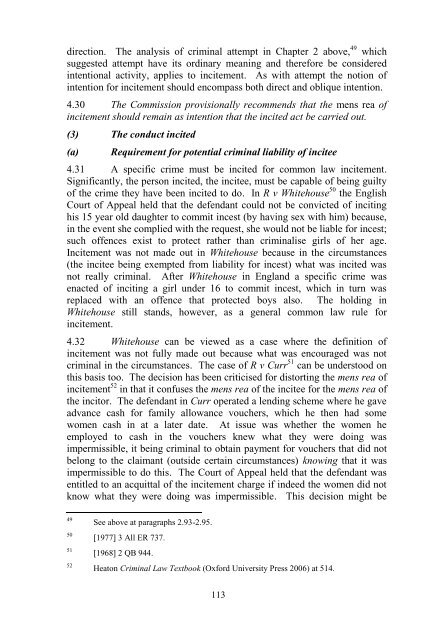Consultation Paper on Inchoate Offences - Law Reform Commission
Consultation Paper on Inchoate Offences - Law Reform Commission
Consultation Paper on Inchoate Offences - Law Reform Commission
You also want an ePaper? Increase the reach of your titles
YUMPU automatically turns print PDFs into web optimized ePapers that Google loves.
directi<strong>on</strong>. The analysis of criminal attempt in Chapter 2 above, 49 whichsuggested attempt have its ordinary meaning and therefore be c<strong>on</strong>sideredintenti<strong>on</strong>al activity, applies to incitement. As with attempt the noti<strong>on</strong> ofintenti<strong>on</strong> for incitement should encompass both direct and oblique intenti<strong>on</strong>.4.30 The Commissi<strong>on</strong> provisi<strong>on</strong>ally recommends that the mens rea ofincitement should remain as intenti<strong>on</strong> that the incited act be carried out.(3) The c<strong>on</strong>duct incited(a)Requirement for potential criminal liability of incitee4.31 A specific crime must be incited for comm<strong>on</strong> law incitement.Significantly, the pers<strong>on</strong> incited, the incitee, must be capable of being guiltyof the crime they have been incited to do. In R v Whitehouse 50 the EnglishCourt of Appeal held that the defendant could not be c<strong>on</strong>victed of incitinghis 15 year old daughter to commit incest (by having sex with him) because,in the event she complied with the request, she would not be liable for incest;such offences exist to protect rather than criminalise girls of her age.Incitement was not made out in Whitehouse because in the circumstances(the incitee being exempted from liability for incest) what was incited wasnot really criminal. After Whitehouse in England a specific crime wasenacted of inciting a girl under 16 to commit incest, which in turn wasreplaced with an offence that protected boys also. The holding inWhitehouse still stands, however, as a general comm<strong>on</strong> law rule forincitement.4.32 Whitehouse can be viewed as a case where the definiti<strong>on</strong> ofincitement was not fully made out because what was encouraged was notcriminal in the circumstances. The case of R v Curr 51 can be understood <strong>on</strong>this basis too. The decisi<strong>on</strong> has been criticised for distorting the mens rea ofincitement 52 in that it c<strong>on</strong>fuses the mens rea of the incitee for the mens rea ofthe incitor. The defendant in Curr operated a lending scheme where he gaveadvance cash for family allowance vouchers, which he then had somewomen cash in at a later date. At issue was whether the women heemployed to cash in the vouchers knew what they were doing wasimpermissible, it being criminal to obtain payment for vouchers that did notbel<strong>on</strong>g to the claimant (outside certain circumstances) knowing that it wasimpermissible to do this. The Court of Appeal held that the defendant wasentitled to an acquittal of the incitement charge if indeed the women did notknow what they were doing was impermissible. This decisi<strong>on</strong> might be49505152See above at paragraphs 2.93-2.95.[1977] 3 All ER 737.[1968] 2 QB 944.Heat<strong>on</strong> Criminal <strong>Law</strong> Textbook (Oxford University Press 2006) at 514.113
















